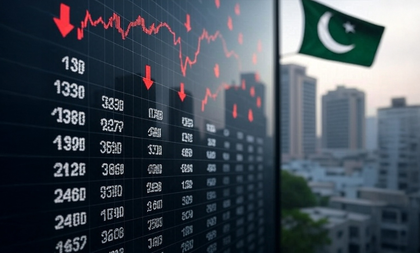Pakistan stock markets continue to bleed, plunges over 1,600 points
By IANS | Updated: October 31, 2025 16:45 IST2025-10-31T16:42:50+5:302025-10-31T16:45:14+5:30
New Delhi, Oct 31 Pakistan’s benchmark stock market index, the KSE-100, has suffered a sharp fall of over ...

Pakistan stock markets continue to bleed, plunges over 1,600 points
New Delhi, Oct 31 Pakistan’s benchmark stock market index, the KSE-100, has suffered a sharp fall of over 1,600 points amid rising geopolitical tensions and disappointing corporate results.
The index closed at 158,465, reflecting widespread selling pressure as investors reacted to growing uncertainty in the economy and the region, according to The Express Tribune.
Market experts said the decline was mainly driven by concerns over strained relations between Pakistan and the Taliban, along with weaker-than-expected earnings from major listed companies.
Trading sentiment remained subdued throughout the session, with most sectors ending in the red.
Out of 340 traded companies, 233 saw their share prices fall, 93 gained, and 14 remained unchanged.
Heavy selling was witnessed in key sectors such as banking, cement, and energy.
Leading blue-chip stocks, including Lucky Cement, United Bank Limited, and MCB Bank, dragged the market down, while National Bank of Pakistan provided some support after reporting strong quarterly profits.
Trading activity also weakened, with turnover dropping to 951 million shares worth PKR 41.3 billion.
K-Electric, Hascol Petroleum, and WorldCall Telecom were among the most actively traded stocks, according to data from Business Recorder.
Analysts said the absence of positive economic triggers and continued political instability have made investors hesitant to take new positions.
They warned that the ongoing uncertainty could further dampen investor confidence and reduce foreign inflows.
Experts urged the government to bring policy stability and take steps to restore trust in the market, noting that volatility is likely to continue until clearer economic direction emerges.
Meanwhile, local media on Friday reported that Pakistan's capital Islamabad and the province of Punjab have been named as "the most dangerous places" for journalists in the country, as violations against the media increased by around 60 per cent in 2025.
Disclaimer: This post has been auto-published from an agency feed without any modifications to the text and has not been reviewed by an editor
Open in app